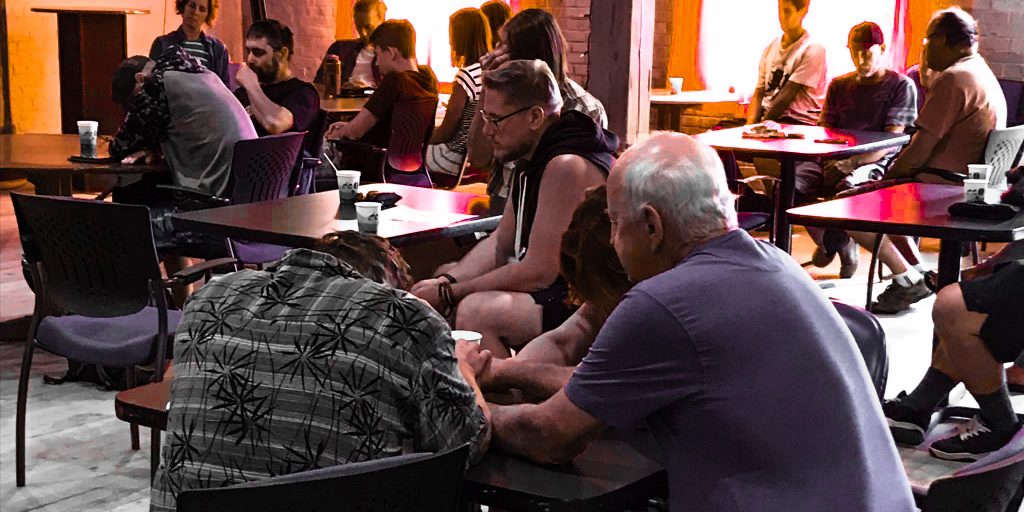Community & Presence (Part 4)
This is the final part of a series. You can read Part 1 here; Part 2 here; Part 3 here.
As the church is present-with marginalized people, it patiently joins together in wrestling with the tension of moving out of an old life into a new one. Practising presence requires patience. We have a God who is patient with us through Christ and we extend that gracious patience to each other. It seems almost silly but in embracing patience we release the drive for efficiency. Efficiency drives us to solve the problem. Marginalized people are not a problem to be solved but like most of us, require patient presence in order to know & understand.
This patience is practised in two ways. One is that the church witnesses to the grace-filled love of Jesus, recognizing the patience of God that we see through Jesus. So as a community, we practise patient grace – almost to the point of sacramental. (I hesitate to use the word sacramental here given my Anabaptist context but I think if you pushed most Anabaptists hard enough, they would say there is a sacramental aspect to community.)
The patience of grace is extended to people who might have no capacity (for variety of reasons) to respond to God in a way we might consider appropriate. For us downtown that takes on very practical forms. From a place to sleep during the day when you’ve been kicked out of everywhere else, to a place to shower with clean underwear and socks. A haircut because its helps with self-esteem — and helps when stand in front of a judge. It means knowing a person well enough that we can deal with an episode of drug-induced psychosis on an individual level rather than having to look up a written policy.

It is also found in our worship. The communal reading of Scripture and times of prayer. Hearing God’s Word, coming to the table to eat together as way of saying everyone has a place, celebrating the Lord’s Supper as the foundation of this patient grace, as a declaration of hope, that we will become what we take in. We have friends who are in the church all week – drop-in on weekdays, attend worship on Sunday without any real history of ‘going to church.’ They come because this is their community/family and because there is ‘something here.’ A friend talks about feeling hope in the songs that are sung, words spoken, but more importantly, in the coming together as a diverse community. “I see it in people, in you, and I want that in my own life.” The church is known as being a safe, respectful place where you are known. And while some contend that we are too patient at times, the practise of patient grace is tangible within the community.
And it should be. I feel the church is too often content to tell people about things, to teach, share knowledge. We sometimes use the language of ‘going deeper’ which largely means gaining more knowledge. The drunk friend with whom I sat on the street corner knows the Bible and has strong theological opinions. So his issue on his journey is not knowledge, its that he has a hard time finding a community in which he can experience and live this new life. The practise of patient grace means that we do not simply tell people that Jesus loves them but they experience that love through a community that is present-with them. They are not simply told that Jesus forgives sin but have experienced and witnessed that grace and forgiveness through a community that is present-with them. It’s a grand invitation into the larger narrative of the kingdom of God. Its not simply that we think it would be a good idea to live this way – there is a story that is already happening. As Hauerwas says, “The story began without us, as a story of the peculiar way God is redeeming the world, a story that invites us to come forth and be saved by sharing in the work of a new people whom God has created in Israel and Jesus.”
And again, for some of our friends, whose lives and bodies and minds are so broken by years of drug use and alcohol and trauma and street life, this is not about getting them the turn around and change but this practise is a covering of grace and we pray that God’s grace covers them because they are part of God’s people.
And for others, encountering this patient grace and seeing a larger story is challenging. There is no question that I have been challenged in some of the assumptions I hold for what a faithful follower of Jesus looks like. I have had to cast aside some cultural expectations and baggage that no longer make sense. And in same way, my friends downtown carry expectations about how life should work. The story of God’s work in our lives and the world crashes into our midst upsetting many of our preconceived notions and assumptions.

But nonetheless, as part of our practise of patient grace, we faithfully tell the story of God’s work in our world, particularly through Jesus. In the light of that grand story, we challenge the assumptions that each other brings. We challenge assumptions that create barriers between each other and between us & God. We challenge practises that lead to addictive behaviours. Rather than simply deal with the addiction (which is a symptom), let’s talk about the life that lies behind it. We practise patient grace because the journey is a complicated one. But we walk together recognizing that much grace is required we journey together.
Finally, prayer is a significant aspect of being patiently present. While this is true regardless of where you find yourself, my experience downtown has opened my eyes to the deep connection between patience and prayer. If you are going to pray, you are going to have to be patient. I have new appreciation for the parable of the persistent widow in Luke 18 or the friend who keeps asking for bread in Luke 11. Spending time with friends at the margins have given these parables renewed meaning. Prayer is part of friendship – with each other, with God. It means engaging in the mystery of prayer, recognizing that we are past giving simple answers. The answers are not simple and often the person does not want answers; they want to be heard, listened to, they want to unload and talk about what is going on with someone. They want someone to care and give some hope. We find that regardless of religion (or not), there is an openness to prayer. I believe the reason for that within prayer there is the promise of hope. The promise of eternal salvation and a new life in the present arouses the hope that things can be different. Prayer is a practise that calls (dares) people into this hope. But we need to be patient in it.
When it comes to the complex issues that are found in the issues of addictions, mental illness, homelessness, poverty, etc., there are times when it feels like all we have to offer are community and presence. But then it turns out that those are beautiful things, some of the greatest gifts we can give to each other. We practise being present, through listening, patiently extending grace and prayer as a way of reflecting the God who gave us the gift of presence in Jesus Christ and the Spirit.
